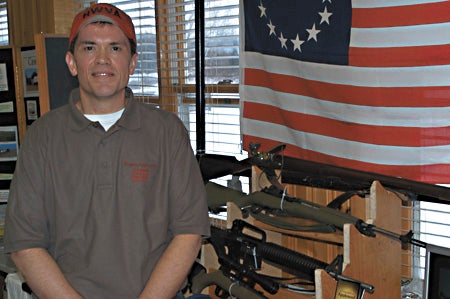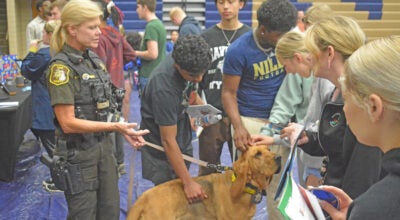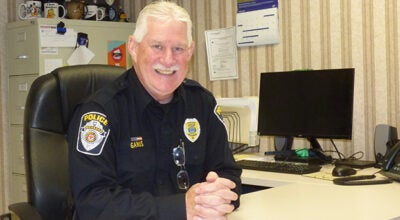Gun advocates gather at Hunters Rendezvous
Published 7:33 pm Sunday, January 27, 2013

Kris Rich of Berrien County represented Project Appleseed Saturday at the 16th annual Hunter's Rendezvous at Dowagiac Conservation Club. (Leader photo/JOHN EBY)
While a national debate rages about how to stanch indiscriminate shooting massacres, Project Appleseed occupies the opposite end of the spectrum.
Appleseed is about rebirth. Started in North Carolina in 2006, it has grown from a single event into a nationwide program that will serve more than 40,000 shooters this year.
Appleseed teaches the fundamentals of the lost art of rifle marksmanship, intertwining these skills with American history and heritage.
Appleseed underscores that rifle skills are as important as on April 19, 1775 (“when marksmanship met history and the heritage began”), when the first shots of the American Revolution were fired on Lexington Green, Mass.
“Appleseed” comes from Johnny Appleseed, the American folk hero who toured the country, planting apple seeds so future generations would benefit.
Attending Appleseed events reacquaints participants with the past and offers them the knowledge and rifle skills necessary to help insure freedom in the future.
Kris Rich of St. Joseph, wearing a red RWVA (Revolutionary War Veterans Association) cap, represented Appleseed at Saturday’s 16th annual Hunter’s Rendezvous at Dowagiac Conservation Club.
“Shooting well is very, very difficult,” Rich said. “But when you relax, think through the mechanics of your position, how to position your body and how to read the wind, it’s so satisfying to be able to connect with a target 400 meters away and realize ‘I did that.’ It’s the opposite of what we see on TV and in video games. What we feel is even more important than marksmanship is history and our colonial forefathers from the American Revolution — the choices, decisions and sacrifices they made in that struggle to give us the gift of our American system of government.”
“We feel people are letting it atrophy, sitting home on the couch watching Honey Boo Boo,” Rich said.
“They’re not going to city council meetings. When was the last time you saw anybody at a city council or school board meeting? Write your senator (Sen. John Proos came to the Conservation Club in search of his constituents). You can do it online. The last thing on my mind is politics. Just get involved.”
“Marksmanship is a uniquely American skill. I’ve always loved to shoot,” the father of three, who is a “marketing guy” in South Bend, Ind., said. “I thought I was a good shot until I tested for my patch in 2007. I scored miserably.”
One hundred and 20 hours of on-the-job training later, Rich is the west Michigan coordinator, or “shoot boss.”
“This year we’re targeting to have 50 shoots statewide,” Rich said. “I have women show up with a box from Walmart and say, ‘What do I do?’ They’re actually the easiest because they don’t have any bad habits I have to break. Over half of our attendees now are women and kids. Women are easier to teach because they have better hand-eye coordination without the testosterone factor of thinking they know everything.
“We instruct safety first. After that it’s learning marksmanship, having fun, enjoying each other laughing and telling stories about the American Revolution. There is something about how this country grew up. We trust the individual. We’re always better when individuals contribute and we’re not being told what to do all the time. I’ve never taken anyone shooting who didn’t come back with a huge grin on their face.”
They use military rifles because they’re fast and easy to reload, like the AR-15 racked on his table with an M1A and a Ruger 10/22.
“We don’t talk politics in our organization,” he said, “but what I do know is these are not new. Teddy Roosevelt took a semi-automatic hunting rifle to Africa. I use mine for competition. This is the dominant rifle at the national championships every year at Camp Perry (Ohio). It’s hard to control madmen. The largest school massacre was in Michigan when a crazy guy blew up the school.”
The Bath school disaster perpetrated by Andrew Kehoe on May 18, 1927, killed 38 elementary school children and six adults and injured at least 58 other people.
Kehoe first killed his wife, fire-bombed his farm and set off a major explosion in Bath Consolidated School, Clinton County, before committing suicide by detonating a final explosion in his truck.
It remains the deadliest mass murder in a school in U.S. history.






